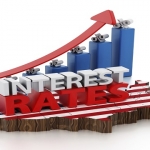For years now we have seen much published conjecture regarding the Fed and when it will raise rates. There are certain economic factors the Fed needs to see in order to raise interest rates — and lately we aren’t seeing those indicators. Usually, the central bank looks to raise rates for one of two reasons: to strengthen the dollar or curb inflation.
Right now, the dollar is the strongest it’s been in years. Deflation simply isn’t happening.
Central banks around the world are slashing their interest rates in an attempt to devalue their currency. Lower yields make government and corporate debt burdens more tolerable and their exports more attractive. One of the biggest culprits right now is the European Central Bank, which is beginning the early stages of U.S.-style quantitative easing. But that’s not even the half of it.
The Bank of Japan is going a step further by purchasing Japanese equities. The central bank is buying stocks one out of every three days, on average, for a total bill so far of $23 billion. That doesn’t even take into account Japan’s $1.1 trillion Government Pension Investment Fund, which is also buying Japanese stocks (among other foreign investments).
Simply put, we’re in the middle of a race to the bottom. Central banks around the world are hopping on the “easy money” bandwagon, and it’s sending global currencies into a tailspin. The Fed doesn’t want to jump off the bandwagon, because it’s our wagon — remember, the Fed was one of the first to devalue its currency during the financial crisis.
Or said another way, the U.S. Fed laid down the first card and other countries have built on top of it. Our entire global economy is essentially a “house of cards” with a financial structure that can and will come crashing down. Between the “currency war” we’re currently in and the lack of economic data to support a rate hike, we simply don’t see Fed taking action — not yet, anyway. But this isn’t going to end well.
“Bond King” Bill Gross seems to agree with us. This is what he had to say in his March investment outlook letter: A more serious concern however, might be that low interest rates globally destroy financial business models that are critical to the functioning of modern day economies. Pension funds and insurance companies are perhaps the most important examples of financial sectors that are threatened by low to negative interest rates.
But it’s not just politicians and investment managers who have to worry about this problem. This affects you and me, too. Here’s more from Gross: In fact even households are handcuffed by low/negative yields, who everyday must now address their inability to save enough money at a high enough rate to pay for education, healthcare, and retirement obligations.
This means, whether you like it or not, if you’re hoping to have enough for the necessities of life in retirement (and otherwise), then CDs and T-bills won’t cut it. We have to play the game.
To learn more about Guy Conger, view his Paladin Registry profile.
Other posts from Guy Conger
Market Volatility Is Nothing New
I’m tasked with writing financial articles for many internet sites and even a few publications. I find this...
Some Words of Wisdom to Investors
Dear Fellow Investor, the events of the last couple of weeks gave me the idea of providing a...
Interest Rates Rise as Fed Decides
After waiting seemingly forever, the Fed finally raised short-term interest rates last week by 25 basis points, or...




